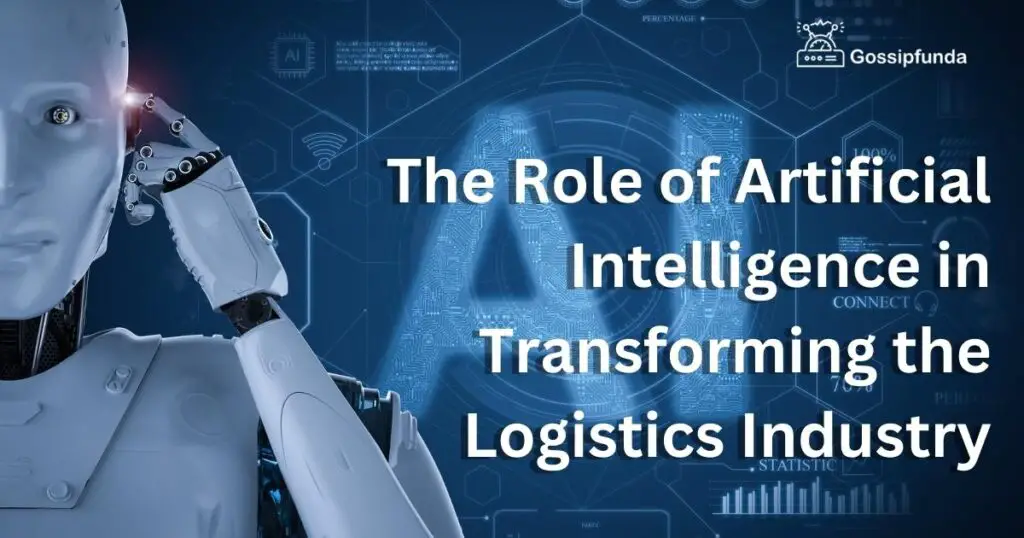Artificial Intelligence (AI) has been transforming various industries, including the logistics and transportation industry. The use of AI in logistics and supply chain management has the potential to revolutionize the way we transport goods, manage inventory, and deliver products to customers.
The logistics and transportation industry is facing numerous challenges, such as rising costs, increasing demand for faster delivery times, complex supply chains, and the need for greater efficiency. Fortunately, AI offers a solution to many of these problems.
The purpose of this article is to explore the role of AI in transforming the logistics and transportation industry. We will examine the benefits of AI and integrated software solutions for logistics and transportation management, and discuss the various ways in which AI is being used to optimize logistics operations. We will also consider the ethical implications of using AI in logistics and look at the potential impact of AI on the workforce.

The Need for AI in Logistics
The logistics industry is facing numerous challenges that require innovative solutions. Some of the challenges include rising costs, increasing demand for faster delivery times, complex supply chains, and the need for greater efficiency.
AI offers solutions to many of these challenges. For example, AI-powered predictive maintenance can reduce equipment downtime and increase efficiency, while AI-based route optimization can improve delivery times and reduce transportation costs. AI can also enhance customer service through the use of chatbots and personalized experiences.
Furthermore, without AI, it would be impossible to analyze the vast amounts of data generated by the logistics industry, making it difficult to optimize operations and make informed decisions.
Therefore, the use of AI is essential for modern-day logistics and supply chain management. By leveraging AI technologies, logistics companies can gain a competitive edge, reduce costs, and provide better service to their customers.
AI and Warehousing
Warehousing is a critical component of the logistics industry, and the use of AI can significantly enhance warehouse operations. AI-powered automation can streamline warehouse processes and reduce the need for human labor, leading to cost savings and increased efficiency.
One example of AI-powered automation in warehousing is the use of robots for picking and packing tasks. These robots can work alongside human workers to improve efficiency and reduce errors. Additionally, AI-powered inventory management systems can optimize inventory levels and reduce waste.
The use of AI in warehousing also enables real-time tracking of inventory levels and helps identify potential issues before they become problems. For example, AI can identify when inventory levels are low and automatically reorder products, ensuring that customers receive their orders on time.
AI and Route Optimization
Transportation costs are a significant expense for logistics companies, and optimizing delivery routes can significantly reduce these costs. AI-powered route optimization is a powerful tool that can help logistics companies to plan and optimize delivery routes to improve efficiency and reduce costs.
AI-powered route optimization algorithms can take into account various factors, such as traffic patterns, weather conditions, and delivery schedules, to generate the most efficient route for each delivery. This can lead to significant cost savings, as well as improved delivery times and customer satisfaction.
Furthermore, AI-powered route optimization can be used to reduce carbon emissions by optimizing routes to reduce the distance traveled and avoid congested areas. This is particularly important in today’s world, where environmental concerns are at the forefront of many people’s minds.
AI and Predictive Maintenance
Equipment downtime is a significant problem for logistics companies, as it can lead to delays, increased costs, and reduced productivity. Predictive maintenance is an AI-powered solution that can help to reduce equipment downtime by predicting when maintenance is needed before a breakdown occurs.
AI-powered predictive maintenance systems use machine learning algorithms to analyze data from sensors and other sources to predict when maintenance is required. This can help logistics companies to schedule maintenance during off-peak periods, reducing the impact on operations.
Predictive maintenance can also improve equipment reliability by identifying potential issues before they become problems, reducing the need for costly repairs and downtime.
AI and Risk Management
The logistics industry is subject to various risks, such as theft, damage to goods, and supply chain disruptions. AI can help logistics companies to identify and mitigate these risks by providing real-time monitoring and analysis of logistics operations.
AI-powered risk management solutions can analyze data from multiple sources, such as sensors, cameras, and weather forecasts, to identify potential risks and provide early warning to logistics companies. This can help logistics companies to take proactive measures to prevent or mitigate risks, such as rerouting deliveries to avoid high-risk areas or adjusting delivery schedules in response to weather conditions.
Furthermore, AI can help logistics companies to optimize risk management by providing real-time tracking of goods and identifying potential issues before they become problems. This can improve the efficiency and effectiveness of risk management processes, leading to cost savings and improved customer satisfaction.
AI and Customer Service
Customer service is a critical aspect of the logistics industry, and the use of AI can significantly improve the customer experience. AI-powered chatbots are becoming increasingly popular in logistics and supply chain management, as they can provide quick and efficient customer support 24/7.
AI-powered chatbots can answer customer queries, provide information about delivery times, and help customers track their orders. They can also provide personalized recommendations based on customer preferences, leading to improved customer satisfaction.
Furthermore, AI can help logistics companies to personalize the customer experience by analyzing data about customer preferences and behaviors. This can enable logistics companies to provide tailored recommendations and promotions, leading to increased customer loyalty and higher sales.
AI and Supply Chain Transparency
Supply chain transparency is becoming increasingly important for both logistics companies and consumers. AI can help logistics companies to improve supply chain transparency by providing real-time tracking of goods and enabling better visibility into the supply chain.
AI-powered supply chain visibility solutions can track goods at every stage of the supply chain, from the warehouse to the customer’s doorstep. This can help logistics companies to identify potential issues before they become problems, such as delays or theft, and take proactive measures to prevent or mitigate them.
Furthermore, AI can provide insights into the supply chain, such as identifying bottlenecks and inefficiencies, which can enable logistics companies to optimize their operations and reduce costs.
Improved supply chain transparency can also enhance customer trust and satisfaction, as consumers are increasingly demanding visibility into the supply chain and the products they buy.
AI and Sustainability
Sustainability is becoming increasingly important for the logistics industry, as companies strive to reduce their environmental impact and meet the demands of consumers who are increasingly concerned about the environment. AI can play a significant role in promoting sustainable logistics practices.
One way in which AI can promote sustainability in logistics is by optimizing delivery routes to reduce transportation costs and carbon emissions. AI-powered route optimization algorithms can take into account various factors, such as traffic patterns, weather conditions, and delivery schedules, to generate the most efficient and environmentally friendly route for each delivery.
AI can also help logistics companies to optimize inventory levels, reducing waste and minimizing the environmental impact of excess inventory. Additionally, AI-powered predictive maintenance can reduce equipment downtime and the need for costly repairs, leading to lower environmental impact and reduced waste.
AI and the Future of Logistics
The use of AI in logistics and supply chain management is still in its early stages, and there is much potential for future developments. As AI technology continues to advance, the logistics industry is likely to see significant changes and improvements.
One area in which AI is likely to have a significant impact is the workforce. While AI can reduce the need for human labor in certain areas, it also creates new opportunities for workers with the skills to work with and manage AI technologies. Additionally, the use of AI in logistics is likely to lead to new jobs in areas such as data analysis and AI development.
The ethical implications of AI in logistics are also an important consideration. As AI becomes more prevalent in logistics, it is essential to ensure that it is used ethically and responsibly, taking into account issues such as privacy, security, and bias.
Conclusion
AI has the potential to transform the logistics industry, providing solutions to many of the challenges faced by logistics companies. From improving efficiency and reducing costs to enhancing customer service and promoting sustainability, the benefits of AI in logistics and supply chain management are significant.
While the use of AI in logistics is still in its early stages, it is clear that AI technologies will play an increasingly important role in the industry in the coming years. The future of logistics is exciting, and AI has the potential to revolutionize the way we transport goods, manage inventory, and deliver products to customers.
As logistics companies continue to adopt AI technologies, it is essential to ensure that they are used ethically and responsibly, taking into account issues such as privacy, security, and bias. By doing so, we can ensure that AI is used to promote the common good and provide benefits to all stakeholders.
In conclusion, the use of AI in logistics and supply chain management is a game-changer, and logistics companies that adopt these technologies will be well-positioned to meet the challenges of the future and provide the best possible service to their customers.
I am passionate about my work. Because I love what I do, I have a steady source of motivation that drives me to do my best.
I’m not comfortable with settling, and I’m always looking for an opportunity to do better and achieve greatness. I have a keen interest in the technical field. Apart from this, I am a social media influencer.

